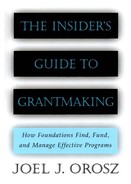Writing the Funding Document
Those three little words, “if written well,” cover a multitude of sins in the writing of funding documents. Getting it right is a challenge, even to a facile writer, for the funding document demands a distinctive and unusual blend of composition skills and styles. This level of sophistication, moreover, is demanded of grantmakers, who, by and large, do not enjoy putting pen to paper. Many things draw people to foundation work—the passion to change the world, a desire to help people, a yen to affect public policy—but rarely is anyone drawn to this calling by a burning desire to generate prose. In fact, many program officers will readily say that writing is the part of their job that they like the least.
In the case of the funding document, this disdain can easily evolve into outright hatred, for creating an effective funding document requires equal skill at two very different types of writing. It must be, on the one hand, a work of scholarship, well researched and carefully documented. If it is not, the committee or board will quickly shred it, and rightfully so. As program officer, you are requesting that the foundation make a considerable financial investment in an organization: you had better be able to document the need for and the wisdom of making that investment. It must therefore be as meticulously supported as any research paper.
Yet if the funding document is solely a collection of facts, figures, and statistics, it would have very little power to move people. Here again enters the spiritual element in philanthropy: committee members and trustees, just as much as program officers, were called to service in foundations by emotional and spiritual desires as much as or more than by cognitive interests. In order to appeal to this passionate side, the funding document must also be compelling and moving. It has to explain the opportunity the project presents and share a vision of how the world will be better if it is funded. The document must therefore be a first-rate piece of persuasive writing.
Finding a good writer of any variety is not an easy task, as professors of English will testily. But to find someone who is skilled at two very different prose styles and who is adept at melding the two into a single document is to find a rare bird, indeed. Most program officers have at least a basic level of skill at creating research papers. Many have, after all, earned advanced degrees in institutions of higher education where writing of that ilk is a core skill. Fewer have experience or ability in authoring persuasive compositions. And only a handful have any idea of how to marry the two into one well-supported, highly persuasive document.
